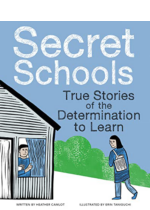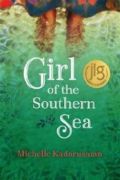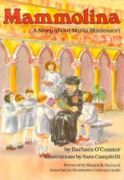When a young teacher sets out to the remote community of Las Delicias in the Amazon rain forest, she is eager to share her knowledge of science, math and geography. While the town’s children love the books she brings, they still keep repeating the legend about a great and dangerous serpent. While in disbelief that her young students could still care about the nonsense of folk tales, the river begins to rise, and suddenly the stories don’t seem to be nonsense after all. Perhaps there are other ways to learn wisdom of past generations besides in books.
education
The Invisible Elephant
In four short stories, The Invisible Elephant tells the story of a young blind heroine who gleefully explores her environment through her senses and imagination. Although she cannot see the world with her eyes, this doesn’t stop her from interacting with her surroundings joyfully. Young readers watch as she learns Braille, with her family and friends cheering her on at every step of the way as she learns to navigate the world in her own unique way. In addition to gorgeous illustrations by Yulia Sidneva and an artful translation by Ruth Ahmedzai, the book includes an illustrated guide that shows readers how to respectfully interact with the visually impaired.
The Invisible Elephant is featured in WOW Review Volume XVII, Issue 3.
The Walking School Bus
Inspired by interviews conducted with children in rural African and India, author Aaron Friedland tells the story of a brother and sister, Shaka and Nandi, who must find a way to get to school safely. With their father having to go to work in a mine far away, they won’t be able to go to school anymore because of the long, and unsafe, distance. But after discovering a yellow toy school bus, Shaka and Nandi come up with a brilliant solution that will take the whole community to help bring it to fruition.
Featured in WOW Review Volume XVII, Issue 1.
Letters In Charcoal
A young narrator recounts learning to read with the help of Señor Velandia, the owner of the village shop, so she can unlock the messages her older sister, Gina, receives from a young doctor each month. In doing so, she will change her life, as well as the lives of every child in the pueblo of Palenque Colombia. Inspired by stories told to the author by Colombian women, Letters in Charcoal celebrates the freedom to read and the joy reading can bring by adding light for a brighter future.
At The Drop Of a Cat
A 6-year old boy loves spending time with his immigrant grandfather, Luis, who teaches him many things as they spend time in his garden, a place of wonder and illumination. It is the place where the boy practices to read and write, as well as the place where he learns of his grandfather’s experiences. As a war refugee, Luis was unable to go to school and therefore never learned how to read and write. But he instills his wisdom of language to his grandson, as well as his experiences and talents as an artist, a cook and a gardener.
This book is part of the WOW Dozen: Difficult and Challenging Topics in Children’s Literature list.
This book is part of the Worlds of Words Global Reading List for 2023/24.
Spare Parts
In 2004, four undocumented Mexican teenagers arrived at the national underwater robotics championship at the University of California, Santa Barbara. No one had ever told Oscar, Cristian, Luis, or Lorenzo that they would amount to much until two inspiring high school science teachers convinced the boys to enter the competition. Up against some of the best collegiate engineers in the country, this team of underdogs from Phoenix, Arizona, scraped together spare parts and a few small donations to astound not only the competition’s judges but themselves, too.
9 Kilometers (Stories From Latin America)
As a young boy walks nine kilometers to school, he travels through the mountain and rain forest landscapes of southern Chile.
Secret Schools

Education goes undercover in this compelling look at some of the world’s most secretive schools through history.
Girl of the Southern Sea

From the time she was a little girl, Nia has dreamed up adventures about the Javanese mythical princess, Dewi Kadita. Now fourteen, Nia would love nothing more than to continue her education and become a writer. But high school costs too much. Her father sells banana fritters at the train station, but too much of his earnings go toward his drinking habit. Too often Nia is left alone to take over the food cart as well as care for her brother and their home in the Jakarta slums.
Mammolina: A Story About Maria Montessori

Describes the life and achievements of the Italian woman doctor who developed a revolutionary method of educating children.
